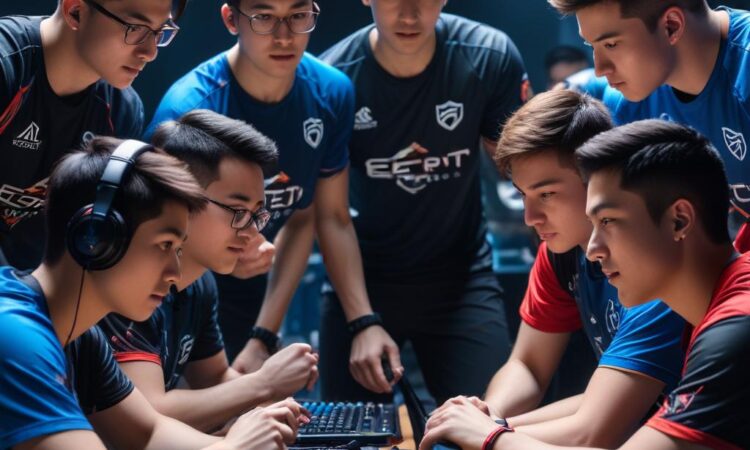Esports and Mental Health: Player Well-being in the Spotlight
The explosive growth of esports has brought immense opportunities and global recognition to professional gamers. However, behind the dazzling lights and lucrative prize pools lies a less glamorous reality: the significant mental health challenges faced by many esports athletes. The pressure to perform at the highest level, coupled with the demanding travel schedules, intense competition, and often-volatile online environments, creates a unique and potentially damaging cocktail for mental well-being.
The Pressure Cooker: Unique Challenges in Esports
Unlike traditional sports, esports often lacks the established support systems and cultural norms around mental health. The intense focus on individual performance, often amplified by the public nature of online streaming and social media, can lead to immense pressure. A single missed play or a loss in a crucial match can be met with harsh criticism, online harassment, and even threats, impacting players’ self-esteem and confidence significantly.
The highly competitive nature of esports also fosters a culture of relentless training and practice. Players frequently dedicate countless hours to honing their skills, leading to sleep deprivation, poor diet, and a lack of time for social interaction and personal well-being. This constant pressure to excel can lead to burnout, anxiety, and depression.
Furthermore, the transient nature of esports careers adds another layer of complexity. Players often face uncertainty about their future, contract negotiations, and the ever-present threat of being replaced by younger, more skilled competitors. This inherent job insecurity contributes to anxiety and stress.
The Growing Awareness: Initiatives and Support
Fortunately, there is a growing recognition within the esports community of the importance of player well-being. Several organizations and teams are proactively implementing initiatives to address these concerns. These include:
- Mental health workshops and resources: Many teams now provide access to mental health professionals, offering workshops on stress management, coping mechanisms, and strategies for maintaining a healthy work-life balance.
- Peer support programs: Establishing networks of support among players themselves, where they can share experiences and offer each other encouragement and understanding.
- Improved communication and team dynamics: Fostering a supportive and inclusive team environment where open communication about mental health is encouraged and players feel comfortable seeking help without fear of judgment.
- Contractual protections: Incorporating clauses in player contracts that address mental health concerns and provide support systems.
- Community initiatives: Raising awareness about mental health issues within the broader esports community through campaigns and educational resources.
- Access to therapy and counseling: Providing players with subsidized or free access to professional mental health services.
The Road Ahead: Addressing the Gaps
While progress is being made, significant challenges remain. The stigma surrounding mental health persists within the esports community, hindering open discussions and preventing players from seeking help. The lack of standardized protocols and regulations across different leagues and organizations also creates inconsistencies in the level of support provided.
Further research is needed to better understand the specific mental health challenges faced by esports players, and to develop tailored interventions and support strategies. This research should consider factors such as age, gender, game genre, and regional variations in cultural norms and access to healthcare.
Greater collaboration between esports organizations, healthcare professionals, and researchers is crucial to developing effective and sustainable solutions. This collaboration should focus on creating a comprehensive and holistic approach to player well-being, integrating mental health support into all aspects of the esports ecosystem.
The Role of Fans and the Community
Fans and the broader esports community also have a crucial role to play in fostering a more supportive environment. Promoting respectful online interactions, avoiding toxic behavior, and showing empathy and understanding towards players can significantly impact their mental well-being. Educating fans about the pressures faced by esports athletes and encouraging them to support initiatives promoting mental health awareness is also essential.
Case Studies and Examples
(This section would contain specific examples of esports organizations or players who have publicly addressed mental health issues, showcasing successful initiatives or highlighting challenges faced. Due to the word count constraint, detailed case studies are omitted here. Examples could include specific teams’ mental health programs or public statements from players discussing their experiences.)
The Importance of Prevention
Proactive measures are essential to prevent mental health issues from developing in the first place. This includes promoting healthy lifestyles among players, educating them about stress management techniques, and fostering a culture of open communication and support. Early intervention is key to preventing minor issues from escalating into more serious problems.
Conclusion
The mental health of esports players is a critical issue that requires ongoing attention and concerted efforts from all stakeholders. While progress is being made, significant work remains to be done to create a truly supportive and sustainable ecosystem that prioritizes the well-being of its athletes. By fostering open dialogue, implementing robust support systems, and promoting a culture of empathy and understanding, we can help ensure that the bright future of esports is one where players can thrive both professionally and personally.
Further research, collaboration, and proactive measures are essential to address the unique mental health challenges faced by esports players and to ensure that they receive the support they need to excel and maintain their well-being.
This is a complex and evolving issue, and ongoing discussion and development of best practices are crucial for the long-term health and success of the esports industry.
(This section could be further expanded to include specific recommendations for future initiatives, research directions, and policy changes.)

